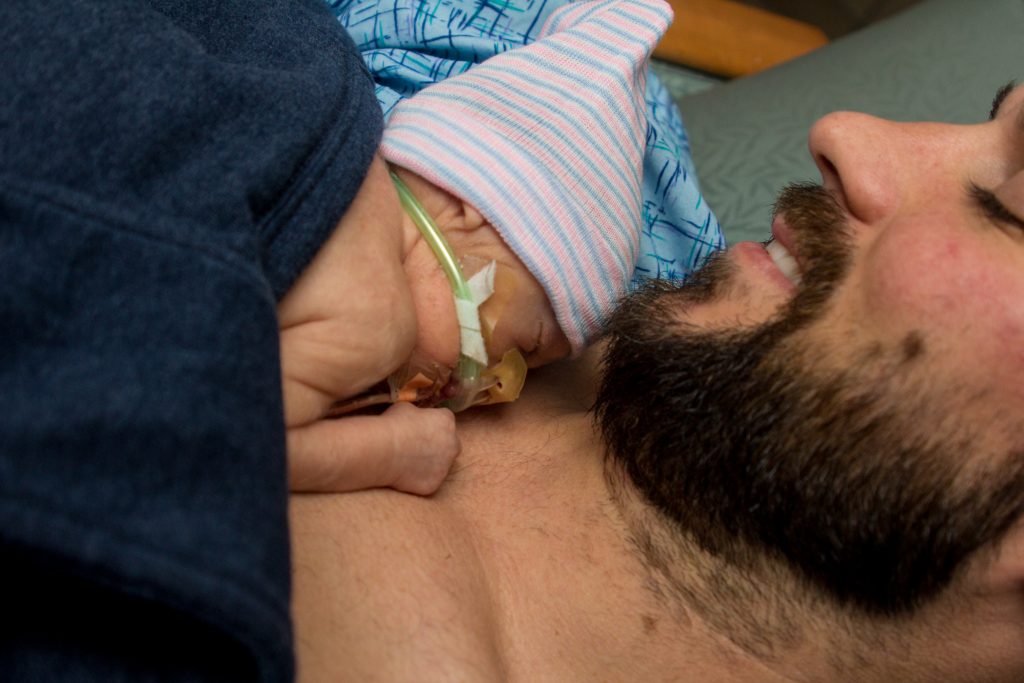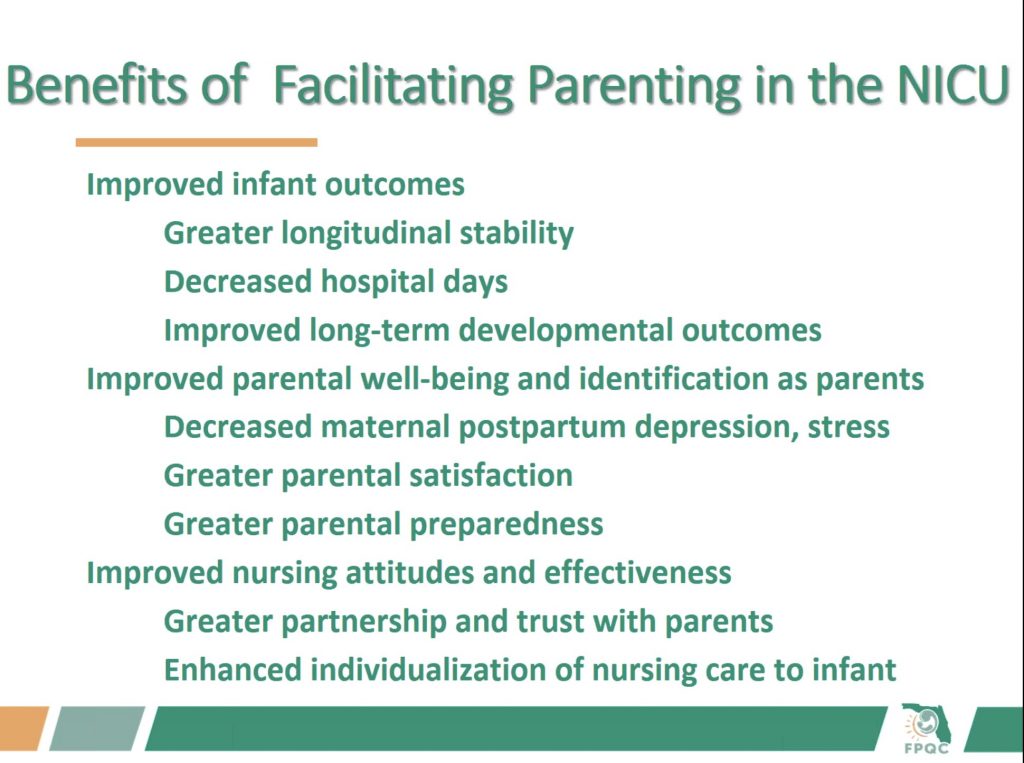New neonatal initiative aims to better involve families
Monica Babich didn’t feel like a mother when she was separated from her daughter Elara following her birth. Skin-to-skin care in the neonatal intensive care unit changed that. By holding Elara skin-to-skin, Monica could feel like a mother and knew she was providing just what Elara needed.

Monica, was one of three mothers and fathers who spoke on the experience of parents of infants in the neonatal intensive care unit at the Florida Perinatal Quality Collaborative’s PAIRED Initiative Kick Off meeting held on March 19, 2021.
FPQC’s new infant health quality improvement initiative PAIRED is focused on improving family-centered care in participating Florida NICUs. The acronym PAIRED comes from the core domains of family-centered care put forth by the Institute for Patient- and Family-Centered Care: (1) PArticipation in care and decision-making; (2) dignity and respect in identifying every infant and family as Individuals; (3) Respectful collaboration with families; and (4) information sharing regarding EDucation for families about medical care. Due to the complexity of family-centered care, PAIRED will be focused specifically on improving skin-to-skin care (SSC) with infants.
Over 90 representatives from 17 pilot hospitals and other stakeholders attended the PAIRED Initiative Kick Off event. Each pilot hospital has assembled a quality improvement team including physician, nurse, and administrative champions. Although virtual, the group was enthusiastic and excited to kick off the project.
The virtual meeting began with a short video on re-imagining NICU care put out by the National Perinatal Association, followed by introductions of the 17 pilot hospital teams. Dr. William M. Sappenfield, FPQC Director, featured a number of “firsts” occurring with this initiative:
- It is FPQC’s first pilot initiative to test protocols and materials with a small group of hospitals, with plans to expand statewide later this year
- It features a parent representative on the Project Advisor Committee, and also had a parent advisory board providing guidance on the development of materials
- It will include obtaining family caregiver input on their experience of NICU care through an online survey.
It was exciting to have our PAIRED Initiative family representative, Lelis Vernon, introduce three members of the parent advisory board to tell their powerful stories of having a baby in the NICU. In addition to Monica Babich, Fabian Tejedor spoke of the special challenges for father involvement in the NICU when so much emphasis is placed on the mother. Shakeema Smiley spoke of the difficulty of skin-to-skin care while her daughter, Lori, was connected to so many tubes and wires. All three parents presented powerful stories to support the need for the PAIRED initiative.

Following the parents was a presentation from the PAIRED Initiative clinical co-leads, Dr. Mark Hudak and Dr. Colby Day Richardson discussing the background and significance of FCC and its implications for infant development and family involvement in care in the NICU and when discharged home. Also presented were clinical guidance on skin-to-skin care including benefits for the infant and family, barriers to SSC, and change ideas for pilot hospitals to implement.
Knowing skin-to-skin care is very important aspect of FCC, but not the only one, FPQC developed additional resources related to family-centered care called PAIRED Plus. Hospitals can choose to add these additional components of FCC to enhance their efforts.
During the virtual kickoff three members of the PAIRED Advisory Group presented on three specific PAIRED Plus topic modules. Elizabeth Simonton, president of ICUBaby, an advocacy group for NICU parents, presented on family inclusion in daily rounds. Dr. Mitchell Stern, a Florida neonatologist presented on complex care conferences and early medical education for families, and Meredith Knapp a neonatal therapist, presented on identifying infants and families by preferred name.
“You know you’re doing well if families feel involved in all aspects of the care of their infant.”
Mark Hudak, MD
Focusing on how to implement the PAIRED Initiative, an overview of the PAIRED toolkit and resources, and specific guidance on next steps for teams was highlighted by the PAIRED nurse consultant, Sue Bowles. Estefania Rubio, FPQC data manager, presented on the PAIRED key driver diagram and measures, and Dr. Maya Balakrishnan, FPQC Associate Director of Clinical and Quality Management wrapped up the day with a presentation on designing PDSA cycles to jump start hospital quality improvement efforts.
Over the course of the initiative, the FPQC will provide monthly quality improvement data reports for each hospital, a toolkit and an online toolbox with resources and tools, and technical assistance to assist hospitals in implementing process changes and improving documentation. The FPQC is available to provide on-site or remote technical assistance, Grand Rounds presentations, and coaching call learning sessions to further assist initiative hospitals with implementation.
For more information on the PAIRED Initiative, visit www.fpqc.org/paired
